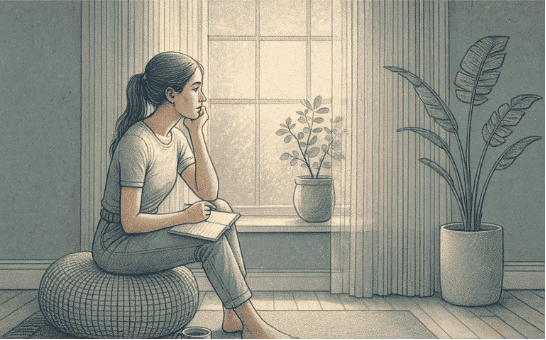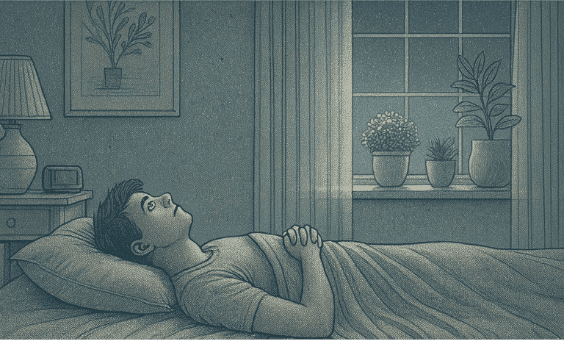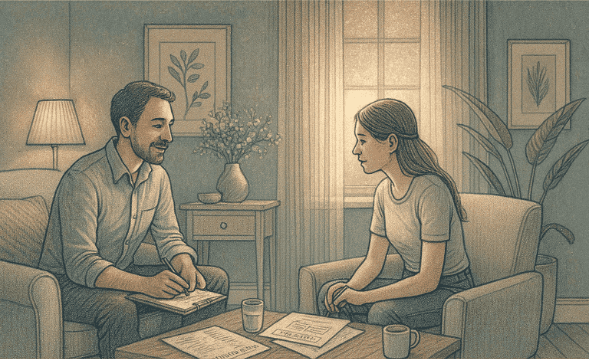
Key Takeaways
- Major depressive disorder is a serious mental health condition marked by persistent symptoms like low mood, loss of interest, fatigue, and distorted self-perception that disrupt daily life.
- Recognizing the symptoms early, such as sleep disturbances, appetite changes, and difficulty concentrating, helps adults and their families understand when professional support is needed.
- Treatment goes beyond medication, with evidence-based therapies like CBT, DBT, IPT, EMDR, and group therapy offering practical tools and lasting relief.
- With proper recognition and treatment, adults with major depressive disorder can experience real improvement, regaining stability, connection, and long-term mental health.
- Mission Connection Healthcare provides comprehensive therapy programs, including individual counseling, group support, and trauma-focused approaches for adults struggling with depression.
Understanding Major Depressive Disorder: Why Recognition and Treatment Matter
Major depressive disorder is a serious mood disorder that affects how you think, feel, and handle daily activities. Unlike temporary sadness that naturally occurs in response to life’s challenges, major depressive disorder involves persistent symptoms that interfere with your ability to work, maintain relationships, and find enjoyment in life.
Many adults struggle silently with depression, believing they should “snap out of it” or that their feelings aren’t serious enough to warrant help. Depression isn’t a sign of weakness; it’s a legitimate mental health condition that responds well to proper treatment.
What makes depression particularly challenging is how it distorts your perception. It creates a lens through which everything appears hopeless, making it difficult to believe improvement is possible. This is why professional support becomes essential. With the right therapeutic support, adults with major depressive disorder can experience significant improvement and develop lasting skills to maintain their mental health.
Mission Connection offers flexible outpatient care for adults needing more than weekly therapy. Our in-person and telehealth programs include individual, group, and experiential therapy, along with psychiatric care and medication management.
We treat anxiety, depression, trauma, and bipolar disorder using evidence-based approaches like CBT, DBT, mindfulness, and trauma-focused therapies. Designed to fit into daily life, our services provide consistent support without requiring residential care.
7 Key Symptoms of Major Depressive Disorder in Adults
1. Persistent Sadness and Low Mood
The hallmark symptom of major depressive disorder is a low mood that lingers most of the day, nearly every day. It’s not a passing sadness but a heavy, unshakable feeling that seeps into everything. Many people describe it as emptiness, hopelessness, or numbness. This shift stands out from your usual emotional state and doesn’t lift, even when good things happen.
2. Loss of Interest or Pleasure (Anhedonia)
Depression strips away your ability to enjoy activities that once brought happiness. This symptom, called anhedonia, affects everything from hobbies and social activities to intimate relationships and career accomplishments. You might go through the motions but feel emotionally disconnected. Many people with depression no longer care about their appearance, their home, or the goals they previously valued.
3. Significant Changes in Sleep Patterns
Depression disrupts sleep in various ways. Many adults experience insomnia—difficulty falling asleep, staying asleep, or waking too early. Conversely, some experience hypersomnia, sleeping excessively yet never feeling rested. You might sleep ten or more hours daily and still want to retreat to bed. Both patterns leave you exhausted and worsen depression symptoms.

4. Changes in Appetite and Weight
Depression significantly affects eating patterns. Some adults lose their appetite entirely, finding food tasteless or feeling too overwhelmed to prepare meals. Others experience increased appetite, particularly craving comfort foods. Eating becomes a way to cope with emotional pain, leading to weight changes that contribute to negative self-perception.
5. Persistent Fatigue and Loss of Energy
Depression creates profound exhaustion that rest doesn’t relieve. Simple tasks like showering or getting dressed require enormous effort. This fatigue isn’t laziness—it’s a genuine symptom of how depression affects your body’s energy systems. The exhaustion extends to mental processes, making thinking feel sluggish and decision-making overwhelming.
6. Difficulty Concentrating and Making Decisions
Depression impairs cognitive function, making it hard to focus, remember information, or make decisions. You might read the same paragraph repeatedly without comprehending it or struggle to follow conversations. Decision-making becomes agonizing, whether choosing what to eat or making important life choices.
7. Feelings of Worthlessness and Excessive Guilt
Depression distorts your self-perception, creating intense feelings of worthlessness and inappropriate guilt. You might blame yourself for things outside your control or interpret neutral events as evidence of inadequacy. This harsh self-criticism involves ruminating over past mistakes and reinforces depression symptoms.
Effective Treatment Options Without Medication
Cognitive Behavioral Therapy (CBT)
Cognitive Behavioral Therapy is one of the most effective treatments for major depressive disorder. CBT helps you identify and change the negative thought patterns and behaviors that maintain depression. Rather than simply talking about problems, CBT provides practical tools you can use immediately.
Your therapist helps you recognize how thoughts influence emotions and behaviors. You learn to challenge distorted thinking patterns, like catastrophizing or black-and-white thinking, and replace them with more balanced perspectives. CBT also incorporates behavioral activation, gradually reintroducing pleasurable activities into your life to break the cycle of withdrawal that depression creates.

Dialectical Behavior Therapy (DBT)
Dialectical Behavior Therapy has proven helpful for depression, particularly when combined with emotion regulation difficulties. DBT teaches four key skill sets: mindfulness, distress tolerance, emotion regulation, and interpersonal effectiveness. DBT’s emphasis on accepting your current reality while working toward change proves particularly valuable. Rather than fighting against painful emotions, you learn to acknowledge them without being overwhelmed.
Interpersonal Therapy (IPT)
Interpersonal Therapy focuses on the connection between your relationships and your depression. IPT recognizes that depression often emerges from difficulties in important relationships: unresolved grief, role transitions, relationship conflicts, or social isolation. You work with your therapist to identify specific interpersonal issues contributing to your depression and develop strategies to address them.
EMDR (Eye Movement Desensitization and Reprocessing)
While EMDR is best known for treating trauma, research demonstrates its effectiveness for depression, particularly when past distressing experiences contribute to current symptoms. During EMDR sessions, you focus on distressing memories while engaging in bilateral stimulation, typically through guided eye movements. This process helps your brain reprocess memories in a way that reduces their emotional impact.
Group Therapy
Group therapy provides unique benefits for depression treatment. Connecting with others who understand what you’re experiencing reduces isolation and shame—two feelings that intensify depression. In group settings, you realize you’re not alone in your struggles and gain perspective from others at different stages of recovery.
Groups focused on depression skills training teach practical techniques while providing a supportive community. You learn from others’ experiences, practice new communication skills in a safe environment, and build meaningful connections that combat depression’s tendency to isolate.
Mission Connection Healthcare: Comprehensive Depression Treatment

At Mission Connection Healthcare, our therapists have extensive training in evidence-based treatments specifically proven effective for depression, including CBT, DBT, IPT, and EMDR. Our individual therapy programs provide a safe, nonjudgmental space to explore your unique experience of depression. We work collaboratively to develop personalized treatment plans that address both immediate symptom relief and long-term recovery.
Group therapy sessions designed specifically for depression offer opportunities to connect with others who truly understand. These groups reduce isolation, provide peer support, and help you practice new skills in a supportive environment. Many clients find that combining individual and group therapy accelerates recovery.
We offer both in-person and telehealth options across California, Virginia, and Washington. Some individuals prefer the convenience of virtual sessions, especially when depression makes leaving home challenging, while others benefit from in-person connection. Our comprehensive approach ensures you have access to all resources needed for recovery.
Call Today 866-833-1822.
Frequently Asked Questions (FAQ)
How do I know if I have major depressive disorder or just normal sadness?
Major depressive disorder involves persistent symptoms lasting at least two weeks that significantly interfere with daily functioning. Normal sadness is connected to specific events and improves naturally over time. If you’re questioning whether your symptoms constitute depression, seek professional evaluation.
Can therapy really help depression without medication?
Multiple research studies demonstrate that therapy, particularly CBT, IPT, and other evidence-based approaches, effectively treats major depressive disorder. Many individuals achieve full recovery through therapy alone. Working with a qualified therapist helps determine the most effective approach for your unique circumstances.
How long does it take for therapy to help with depression?
Many people begin noticing improvement within the first several weeks of consistent therapy. The timeframe varies based on symptom severity and your engagement with treatment. Consistent attendance and willingness to try new approaches accelerate progress.
What if I don’t have the energy or motivation for therapy?
Lack of energy and motivation are core symptoms of depression, not personal failings. Therapists trained in depression treatment understand this and won’t expect you to feel motivated initially. Part of effective treatment involves working with your current energy level and gradually building momentum.
How does Mission Connection support adults struggling with major depressive disorder?
Mission Connection provides flexible outpatient programs designed for adults who need more than weekly therapy sessions but don’t require residential care. Services include individual and group therapy, experiential approaches, psychiatric care, and medication management. Using evidence-based treatments like CBT, DBT, mindfulness, and trauma-focused therapy, we help adults manage depression while still maintaining their daily routines.


